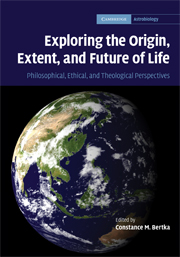 Exploring the Origin, Extent, and Future of Life
Exploring the Origin, Extent, and Future of Life from Part I - Origin of life
Published online by Cambridge University Press: 29 December 2010
Introduction
The origin of life has always been a topic charged with religious import. This chapter aims to survey briefly some origin-of-life ideas over time; first, if we look in detail at how the debate over life's origin played out between Darwin and his supporters, we will see a clear example of this. Note that I said Darwin's supporters, rather than his opponents. We expect a story about the new evolutionary science to include much heated objection from religious groups, for whom so many aspects of Darwin's theory produced problems. But a look at how divisive the issue was among the Darwinians themselves is an even more complex and enlightening story, perhaps of more relevance to scientists in their own work.
By the 1850s, William Benjamin Carpenter, Professor of physiology at the Royal Institution of London, believed, as did Herbert Spencer, that the vital force of living things was completely interconvertible with forces from non-living nature such as heat, electricity, kinetic energy, etc. However, also like Spencer and a number of others in the Darwinian camp, Carpenter believed that the conversion of heat or chemical energy into vital energy could only be accomplished through the agency of already living matter; in other words, that non-living matter could never organize itself into living matter capable of generating vital force. This served as a convenient theoretical barrier separating modern physiology and its ally, the new evolution theory, from the bête noir of spontaneous generation.
To save this book to your Kindle, first ensure [email protected] is added to your Approved Personal Document E-mail List under your Personal Document Settings on the Manage Your Content and Devices page of your Amazon account. Then enter the ‘name’ part of your Kindle email address below. Find out more about saving to your Kindle.
Note you can select to save to either the @free.kindle.com or @kindle.com variations. ‘@free.kindle.com’ emails are free but can only be saved to your device when it is connected to wi-fi. ‘@kindle.com’ emails can be delivered even when you are not connected to wi-fi, but note that service fees apply.
Find out more about the Kindle Personal Document Service.
To save content items to your account, please confirm that you agree to abide by our usage policies. If this is the first time you use this feature, you will be asked to authorise Cambridge Core to connect with your account. Find out more about saving content to Dropbox.
To save content items to your account, please confirm that you agree to abide by our usage policies. If this is the first time you use this feature, you will be asked to authorise Cambridge Core to connect with your account. Find out more about saving content to Google Drive.